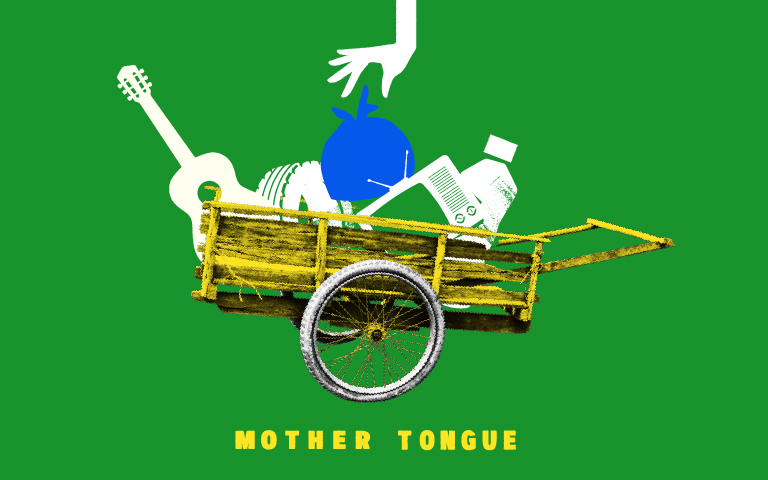Congratulations to graduate student Anjuli Webster on being selected as a dissertation fellow for Emory’s upcoming Mellon Sawyer Seminar, “Visions of Slavery: Histories, Memories, and Mobilizations of Unfreedom in the Black Atlantic.” Funded by a $225,000 grant from the Mellon Foundation, the seminar will bring together scholars at Emory and Atlanta-area universities to examine the “manifold ways slavery in the Black Atlantic has been archived, interpreted, memorialized, mobilized, and resisted.” Webster’s nine-month fellowship will provide opportunities to participate in planning the seminar, as well as support for conducting research and presenting findings related to the seminar’s central theme. Webster’s dissertation, advised by Drs. Clifton Crais, Mariana P. Candido, and Yanna Yannakakis, is titled “Water’s Power: Ecologies of Sovereignty, Race, and Resistance in south Indianic Africa.”
Category / Graduate Students
Graduate Student Jessica Markey Locklear Participates in UMBC Roundtable
Doctoral student Jessica Markey Locklear recently participated in a conversation hosted by the University of Maryland, Baltimore County’s Albin O. Kuhn Library. Titled “Indigenous Community Archiving and Collective Memory,” the virtual roundtable centered on community archiving projects within American Indian communities of Baltimore and Philadelphia. Locklear was joined in the conversation by Siobhan Hagan (founding director, Mid-Atlantic Regional Moving Image Archive), Tiffany Chavis (Consulting Archivist, UMBC), and Ashley Minner (Assistant Curator for History and Culture, Smithsonian National Museum of the American Indian). Locklear’s dissertation, advised by Dr. Malinda Maynor Lowery, is titled “The Other Lands We Know: Lumbee Migrations and the Maintenance of Indian Identity, 1880-1980.”
Amelia Golcheski Wins Dissertation Research Fellowship from UNC’s Wilson Library
Congratulations to graduate student Amelia Golcheski on receiving a Dissertation Research Fellowship from the Wilson Library at the University of North Carolina Chapel Hill. The $3,500 fellowship will support a one month residency at the Wilson Special Collections Library. Golcheski’s dissertation, advised by Drs. Jason Morgan Ward and Allen Tullos, is titled “Compensating Care: The Professionalization of Women’s Care Labor in Appalachia, 1968-2000.”
Lesser Named 2022 Eleanor Main Graduate Faculty Mentor

Congratulations to Dr. Jeffrey Lesser, Samuel Candler Dobbs Professor of History and Director of the Halle Institute for Global Research, on receiving the 2022 Eleanor Main Graduate Faculty Mentor Award. Named for an extraordinary Emory faculty member, mentory, and leader, the Main award has the following aims: to recognize outstanding faculty who are engaged in the Emory/LGS community and academic or professional communities related to their discipline through mentorship; to legitimize the importance of mentoring of graduate students within the larger context of graduate education; and to foster mentoring of the highest quality. Lesser’s nomination was supported by faculty in multiple programs across campus as well as PhD program alumni, who cited him as an inspiring mentor of graduate students. The award will be presented at the 2022 commencement ceremony.
Danielle Lee Wiggins (PhD ’18) Wins ACLS Fellowship
Dr. Danielle Lee Wiggins, Assistant Professor at the California Institute of Technology and a 2018 graduate of the PhD program, has won a fellowship from the American Council of Learned Societies. Wiggins is one of sixty scholars nationwide selected for the prestigious ACLS Fellowship, which recognizes outstanding scholarship in the humanities and interpretive social sciences. The fellowship will support Wiggins’s work on her current manuscript project, titled “The Politics of Black Excellence: Atlanta and the Making of Modern Black Politics.” Jimmy Carter Professor of History Dr. Joseph Crespino served as Wiggins’s advisor at Emory. Read the abstract of Wiggins’s project below.
“This project examines how black political leaders in Atlanta in the 1970s and 1980s managed three challenges associated with the postindustrial urban crisis—crime, family instability, and joblessness— with what this project calls the ‘politics of black excellence.’ This approach entailed the expansion of existing practices of racial uplift into the realm of policy. Adherents sought to discipline black people with policies purported to fortify black communities against the internal threat of ‘black-on-black’ crime, restore the black nuclear family, and cultivate diligent black workers. This study argues that in proposing reform of the self, the family, and black communities as solutions to structural crises, Atlanta’s black political class innovated new modes of black politics and Democratic governance.“
Andrew G. Britt (PhD ’18) Serves as Dramaturg for UNCSA Play about Brazilian Waste Pickers
Dr. Andrew G. Britt, Assistant Professor at the UNC School of the Arts and a 2018 alumnus of the graduate program, served as a dramaturg over the 2021-’22 academic year for a UNCSA play focused on Brazilian waste pickers (catadores). Titled Mother Tongue, the production was conceived of and directed by Marina Zurita, a fourth-year student in UNCSA’s top-ranked drama program. That play was a devised piece, meaning that Zurita and the cast collectively produced the play’s central narrative together. Interviews that Zurita conducted with catadores in her native city of São Paulo served as the raw material for the devising process. Britt provided support to Zurita throughout the research process and to the director and cast while they devised the narrative, including by offering short courses on Brazilian history and culture and organizing virtual conversations with other Brazilian scholars. Check out the dramaturg’s note that Britt composed below for the show’s program and read more about Mother Tongue here: “‘Mother Tongue’ is first devised theater production at UNCSA by a student.”
Every day throughout Brazil, hundreds of thousands of pickers, or catadores in Portuguese, comb through the solid materials either discarded by the country’s more than 210 million residents or exported to Brazil from other nations. Pickers collect paper, plastic, glass, aluminum and other metals, frequently amid
hazardous environmental conditions. They transport these materials to processing facilities, sort and organize them and resell them to companies who utilize them to produce new goods.Without the informal labor of this fleet of green-collar workers, millions of tons of recyclable materials would end up in landfills. Though not formally employed by Brazilian public institutions like municipal governments, pickers perform an essential public service. Some estimates hold that pickers contribute to the processing of 90% of Brazil’s recycled materials. Other countries throughout the world, especially those in the Global South, similarly depend on pickers for recycling streams and waste management. Even New York City has its own cadre of between 8,000-10,000 pickers, known locally as canners, who scour
city streets for reusable material.While pickers perform essential labor worldwide, their work has long been unrecognized by government officials and stigmatized by society at large. This dynamic has begun to shift in recent years, however. Over the last three decades, coalitions of pickers in countries like Brazil and Colombia have led effective movements for greater rights and recognition. Brazilian federal law now grants pickers some protections and benefits as laborers, and Brazilian cities are now officially incentivized to coordinate with pickers in their waste management programs. The inclusion of pickers in state-coordinated recycling streams in Brazil has influenced public policy in other countries. The grassroots movement that brought about these changes has deep roots in the city of São Paulo at a local picker-led recycling cooperative where materials are sorted and sold. Some of the stories in “Mother Tongue” were inspired by the workers at this cooperative.
Even as the labor of pickers has become more recognized, the lives of pickers themselves remains shrouded in stigma and prejudice. With “Mother Tongue,” we invite audiences to cross these barriers of misunderstanding and connect with the inner and outer lives of these essential workers.
Graduate Student Anjuli Webster Presents at “Charting African Waterscapes” Conference
History graduate student Anjuli Webster recently presented a paper at the conference “Charting African Waterscapes: A Conference on African Maritime History Across Time and Space.” Webster’s paper was titled “’Kawubheke ukuphangelana kwemifula’: isiNguni waters through Maputo Bay” and was delivered on the panel “Political Ecologies of Water.” Webster’s research uses water as a way to understand the convergence of local and global forces in south Indianic Africa in the nineteenth century. Webster’s dissertation is titled “Water’s Power: Ecologies of Sovereignty, Race, and Resistance in south Indianic Africa.”
Graduate Student Katrina Knight Presents at Univ. of Maryland HGSA Graduate Conference
History graduate student Katrina Knight recently presented at the University of Maryland’s 16th annual Graduate History Conference. Delivered on a panel with the theme “Histories of Subaltern Revolt,” Knight’s paper was titled “Rebellion, Reformation, or Romanization? The Barbarian Reges and the ‘End’ of the Western Roman Empire.” The focus of the conference this year was “Conflict, Protest, Insurrection, Coup.” Knight’s research centers on the ways in which Roman cultural identity intersected with provincial identity during and after the Roman Empire. Her dissertation is titled “Becoming UnRoman: Romans and Romanness in Late Antique and Early Medieval Britain and Italy, AD 400-700.”
Anastasiia Strakhova to Present at Tam Institute Symposium
Graduate student Anastasiia Strakhova will present on her research at the upcoming Brickman-Levin Symposium, organized by the Tam Institute for Jewish Studies and Laney Graduate School. Strakhova’s talk is titled “Selective Emigration: Border Control and the Jewish Escape in Late Imperial Russia, 1881-1914.” The symposium will take place via Zoom on Wednesday, April 6, at 7pm.
Update – Find a recording of the event here: “The Brickman-Levin Symposium.”
Camille Goldmon to Present at Southern Historical Association’s Junior Scholars Workshop
Doctoral candidate Camille Goldmon will present a paper as part of the Southern Historical Association’s Junior Scholars Workshop (via Zoom) on March 17, 2022, from 4-5pm. Goldmon’s paper is titled “Shades of Radicalism: The History of Radical Agrarian Organizations in Alabama.” Connie Lester (UCF) and R. Douglas Hurt (Purdue) will offer brief commentary.


